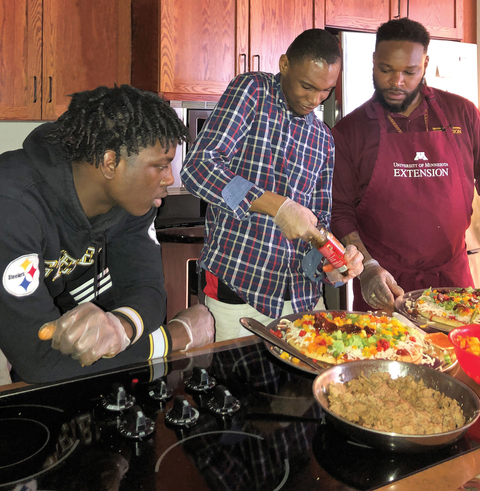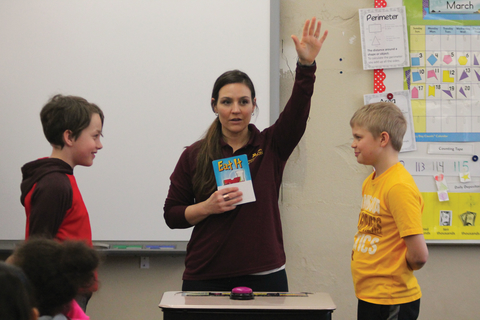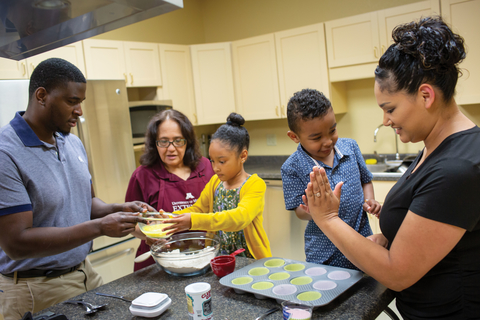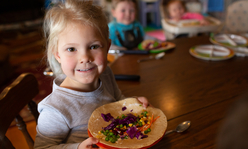Extension serves low-income Minnesotans through two federally funded programs: the Expanded Food and Nutrition Education Program (EFNEP) and Supplemental Nutrition Assistance Program Education (SNAP-Ed). EFNEP focuses on families and youth, while SNAP-Ed works with anyone who receives SNAP benefits. SNAP-Ed is offered statewide, while EFNEP focuses on the Twin Cities metro area.
On a Wednesday night in North Minneapolis, teenage boys are busy chopping bell peppers and broccoli to top a veggie-packed pizza. They’re in the teaching kitchen at the Robert R. Jones Urban Research and Outreach-Engagement Center (UROC) with Extension EFNEP nutrition educator Michael Stratten.
Before starting in on the afternoon’s recipe, Stratten asked each teen how he was doing. Their struggles from the past week weren’t small, but they shared them—and their successes too. Then, Stratten led a short lesson about nutrition and how eating plenty of fruits and vegetables can help prevent serious problems like diabetes and heart disease. For Stratten, nutrition education is more than just a job, it’s an opportunity to strengthen his community. “Being a nutrition educator gives me the chance to build relationships, learning from one another as we work together to create a culture of health,” he says.
The teenagers were brought to the cooking class by Airrion Williams, a case manager at NorthPoint Health and Wellness Center, a local nonprofit. Williams met Stratten years ago and Williams continues to bring the young men he works with to nutrition classes taught by Stratten. That checking-in on struggles and successes at the beginning of class makes a difference in how the teens relate to Stratten. “The guys are more conscious of what they’re putting in their bodies and they have more confidence in the kitchen,” Williams says.
“Turkey burgers are delicious. I could eat five of these,” participant Muhammad Blount exclaimed during Stratten’s class. “So this is lean meat?”
Educators like Stratten understand how to best reach the youth and families they work with. “They’re advocates for their community,” says Cassie Silveira, an Extension educator in health and nutrition who directs Extension’s EFNEP program.
Cooking at school
Extension nutrition educators work with youth and adults in a variety of settings, including after-school programming, alternative schools, recovery programs and community centers.
Jaime Harris, Extension EFNEP educator, works with elementary schools in Minneapolis and Robbinsdale, coming into the classroom weekly for a six-week session with third and fourth graders. A typical visit includes a short interactive lesson, and then the class splits into small groups and takes turns making the recipe of the day with Harris.
She teaches them simple and healthy recipes that they gather into a cookbook so they can make them at home.
“Last year, we did this thing called an apple wrap, where you use, like sunbutter and apples,” says one student. “It was really good.”
“I really liked the banana split,” says another student. “It had all my favorite foods, like yogurt, bananas, strawberries and even some chocolate chips.”
Healthy eating for the whole family
Leticia Rodriguez, SNAP-Ed educator in Nobles, Rock and Murray counties, says teaching about balanced diets and exercise helps participants and their entire families. She emphasizes to parents that living a healthy lifestyle sets a good example for their children and helps prevent chronic diseases like diabetes and heart disease that could get in the way of them being able to care for their families.
Rodriguez finds she gets more buy-in from participants when she gets to know them and what they care about. “You have to find something that they’re very passionate about and it’s usually their kids,” she says.
This summer, Rodriguez started a Power of Produce (PoP) club at the Worthington farmers market. “This initiative provides fun fruit-and-vegetable-related activities for the kids, along with tokens they can spend at the market and a recipe for their parents,” she says. “The goal is to get kids and their families excited about the local food right in their own community.”







